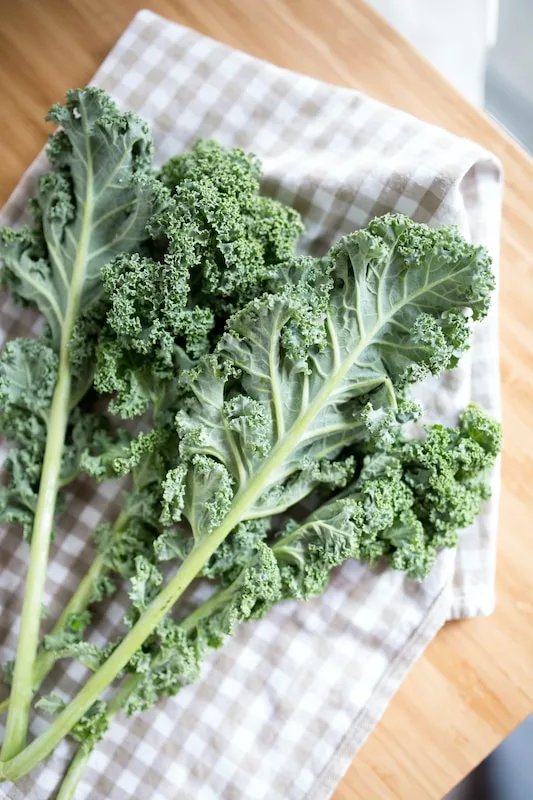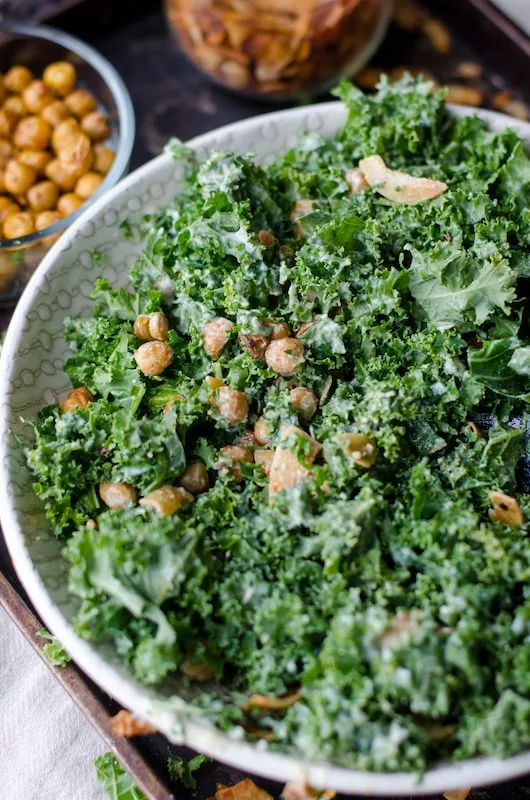
In recent years, kale has taken the culinary world by storm, earning its rightful place in salads, smoothies, and various dishes. This leafy green has gained popularity not just for its earthy flavor and versatility in the kitchen but also for its impressive array of health benefits.
From being a nutrient powerhouse to its potential to protect against chronic diseases, kale is a true superfood that deserves a place in your regular diet.
In this blog post, we’ll explore the many health benefits of kale and why you should consider adding more of this leafy green to your meals.
Table of Contents
Harnessing the Leafy Green Power: Kale’s Key to a Healthier You
1. Nutrient-Dense
Kale is often referred to as a “nutrient powerhouse,” and for good reason. It’s loaded with essential vitamins and minerals, making it one of the most nutrient-dense foods available. Just one cup of raw kale provides:
- Vitamin K: Kale is exceptionally rich in vitamin K, which is crucial for blood clotting and bone health.
- Vitamin A: Kale contains beta-carotene, a precursor to vitamin A, essential for vision, immune function, and skin health.
- Vitamin C: An antioxidant that supports the immune system and skin health.
- Calcium: Important for bone health and muscle function.
- Potassium: Essential for heart health and regulating blood pressure.
- Folate: An important B-vitamin that supports cell division and helps prevent neural tube defects in pregnancy.
- Iron: Necessary for transporting oxygen throughout the body.

2. Powerful Antioxidants
Kale is rich in antioxidants, including quercetin and kaempferol, which help protect your body from oxidative stress. Antioxidants neutralize harmful free radicals that can lead to chronic diseases and aging. Consuming kale regularly can contribute to better overall health and longevity.
3. Anti-Inflammatory Properties
Chronic inflammation is linked to a range of health problems, including heart disease, cancer, and autoimmune conditions. Kale contains compounds that have been shown to help reduce inflammation in the body. One such compound is glucosinolates, which can be converted into anti-inflammatory molecules during digestion.
4. Heart Health
Kale can play a significant role in supporting heart health. Its high fiber content helps lower cholesterol levels, reducing the risk of heart disease. Additionally, the potassium in kale helps regulate blood pressure, further protecting your heart.
5. Weight Management
Kale is incredibly low in calories but high in fiber, making it an excellent choice for weight management. The fiber in kale helps you feel full, reducing overall calorie intake. Plus, its combination of nutrients supports a healthy metabolism.
6. Eye Health
The beta-carotene in kale, which the body converts to vitamin A, is essential for maintaining good vision and eye health. Regular consumption of kale can help reduce the risk of age-related eye conditions like macular degeneration and cataracts.
7. Cancer Prevention
Kale contains compounds like sulforaphane, which has been studied for its potential cancer-fighting properties. These compounds may help inhibit the growth of cancer cells and reduce the risk of certain types of cancer, such as colorectal cancer.
8. Digestive Health
The high fiber content in kale promotes healthy digestion by preventing constipation and supporting a diverse gut microbiome. A healthy gut is linked to improved overall health and a stronger immune system.
Here’s delicious and nutritious kale recipes to help you incorporate this leafy green into your meals:

Kale and Quinoa Salad:
Ingredients:
- 1 cup quinoa
- 2 cups water or vegetable broth
- 3 cups kale, stems removed and chopped
- 1/2 cup cherry tomatoes, halved
- 1/4 cup red onion, thinly sliced
- 1/4 cup feta cheese, crumbled
- 1/4 cup toasted pine nuts
- 2 tablespoons olive oil
- 2 tablespoons lemon juice
- Salt and pepper to taste
Instructions:
- Use cold water to rinse the quinoa. Combine quinoa with water or vegetable broth in a saucepan. Bring to a boil, then lower to a low heat, cover, and leave to cook for 15-20 minutes, or until the quinoa is tender and the liquid has been absorbed. With a fork, fluff and allow to cool.
- In a large bowl, massage the kale with olive oil and lemon juice for a few minutes to soften it.
- Add the cooked quinoa, cherry tomatoes, red onion, feta cheese, and pine nuts to the kale.
- Season with salt and pepper, and toss everything together. Serve chilled.
Get more nutritious recipes here.
Conclusion on Health Benefits of Kale
Kale is not just a trendy superfood; it’s a nutritional powerhouse with a wide range of health benefits. Incorporating kale into your diet can provide essential vitamins, minerals, and antioxidants while offering protection against chronic diseases and promoting overall well-being.
Whether you enjoy it in a salad, smoothie, or sautéed with other vegetables, kale is a delicious and nutritious addition to any meal.
So, next time you’re at the grocery store, be sure to pick up some kale and savor the benefits it can bring to your health.
You can also visit our Facebook and YouTube pages to know more about plants and their health benefits.
You might also like:








